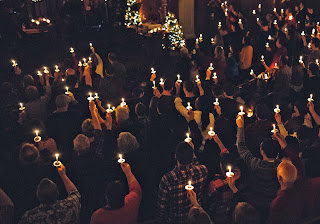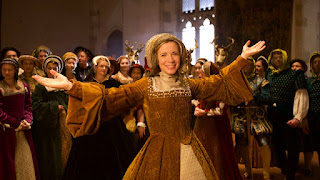Christmas Eve is on December 24 and marks the culmination of the Advent period before Christmas that starts on the fourth Sunday before Christmas Eve. Many churches mark the end of Advent with midnight church services. During modern times, it is popularly celebrated on the night before Christmas Day.
The tradition of celebrating Christmas Eve derives partly from Christan liturgy starting at sunset, which is inherited from Jewish tradition and based on the Book of Genesis’s Story of Creation, saying the first day starts in the evening and ends in the morning. It is also believed that Jesus, or Jesus of Nazareth, was born at midnight in the region of Palestine. Many historical conceptions on ancient traditions contributed to the development of eve celebrations, which persisted in the early Christian calendar.
Christmas Eve marks the end of the Advent season, the period of preparation for Christmas, which begins on November 30, or November 15 in the East. It was on this night that the shepherds keeping watch over their flocks outside Bethlehem saw the bright star in the sky that signaled the birth of Jesus Christ. This is why many churches have services beginning on the fourth Sunday before Christmas. From the 12th to the 15th century, due to the Holy Inquisition, Christian traditions were made mandatory. During the 16th century, the church was influenced by the Winter Solstice celebrations and began Christmas preparations the night prior.
In many parts of Europe, people believe that at midnight on Christmas Eve, animals briefly possess the power of speech. It might have been the traditional association of the ox and the donkey in the Nativity scene that gave rise to such superstitions, but the concept of talking animals is probably pagan in origin. A closely related belief, widespread in England and Europe, is that cattle rise in their stalls at midnight on Christmas Eve, or kneel to worship the Christ child.
Despite its Christian significance, there are a number of pagan and supernatural beliefs connected with Christmas Eve. In Scandinavian countries, it is believed that the dead revisit their former homes on Christmas Eve. People make sure that their parlors are tidy and that a good fire is burning before they go to bed. They often light candles, set the table, and leave out plenty of food for their ghostly visitors. They also make sure that the seats of their chairs have been dusted. When they get up in the morning, they wipe the chairs again with a clean white towel. If they find any dirt on the seat, it means that a relative fresh from the grave sat there during the night.
The Bible does not clearly answer this question. Evidently, the first Christians didn’t make a point of celebrating the birth of Christ. If they knew the precise date of his birth, they didn’t make an issue of it. One writer notes that various leaders in the early church suggested the following dates for Jesus’ birth: January 2, January 6, March 21, March 25, April 18, April 19, May 20, May 28, November 17. All we can take from this is that the precise date was hidden and unknown to them even though they were much closer to the historical event than we are.
The traditional date of December 25 goes back as far as A.D. 273. Two pagan festivals honoring the sun were also celebrated on that day and it is possible that December 25 was chosen to counteract the influence of paganism. To this day some people feel uncomfortable with Christmas because they think it is somehow tainted by the pagan festivals held on that day. But Christians have long believed that the gospel not only transcends culture, it also transforms it. In A.D. 320 one theologian answered this criticism by noting, “We hold this day holy, not like the pagans because of the birth of the sun, but because of him who made it.”
Having said that, you may ask, “Does it really matter?” In one sense, of course, the answer is no. No doctrine of the Christian faith rests upon knowing the exact day and year of Christ’s birth. And no stress is put upon the date of his birth in the New Testament. No one is ever told to celebrate Christmas. The emphasis always rests on the fact of his birth, not the date. But that doesn’t tell the whole story. Christianity is a faith based on certain historical facts. Let us on this Christmas Eve rejoice in this great truth:
Origins of Christmas Eve
For centuries, Christmas was celebrated not as a single day, but as a whole season in parts of the world, beginning with this day, December 24, Christmas Eve. Perhaps the practice of celebrating the evening before the big day is an echo from ancient Jewish reckoning. Among earlier Jews, a day began at six in the evening and ran until six the following evening. Had not Moses written: "An evening and a morning were the first day"?
Christmas means "Christ-mass." Although the date is a guess, the tradition of observing it goes back to at least the fourth century. Under the influence of the church, Christian traditions replaced pagan solstice festivals throughout Europe. Often the more innocent pagan practices (such as bringing in a Yule log, decorating with holly and the like) were carried over into the Christmas observance, transfigured with new meaning.
Christmas Eve Traditions
Christmas Eve (the evening before Christmas day) was then celebrated with roaring fires, story-telling, feasting, drinking, dancing, and sometimes clowning. Sir Walter Scott described its festive air in a poem:
On Christmas Eve, the bells were rung;
On Christmas Eve, the mass was sung.
...
The damsel donned her kirtle sheen,
the hall was dressed with holly green;
...
All hail'd with uncontroll'd delight,
And general voice the happy night
That to the cottage, as the crown,
Brought tidings of salvation down.
The History of Christmas Eve
Things weren't always so pleasant, however. On Christmas Eve, 1521, with the Reformation gaining steam in Germany, crowds rioted in Wittenberg. Against the orders of Elector Frederick, Andreas Carlstadt had given them both the bread and wine at mass. Zealous for more "reformation," the mob smashed church lamps, sang ridiculous songs to drown out the choir and intimidated the priests.
Luther is supposed to have cut the first Christmas tree. The story may be apocryphal, but we know that on Christmas Eve, 1538, he was in a jolly mood, singing and talking about the incarnation. Then he sighed, saying, "Oh, we poor men, that we should be so cold and indifferent to this great joy which has been given us."
Despite Luther's lament, others would make warm memories on Christmas Eve. In his memoirs, Sir John Reresby told how he invited his poor tenants for a feast on Christmas Eve, 1682. During World War I, the famous Christmas Truce began for many troops on Christmas Eve, 1914, demonstrating the power for good that is inherent in the season.
Portions of this article were adapted from Christmas Eve Then and Now by Dr. Ray Pritchard from Christianity.com
















No comments:
Post a Comment